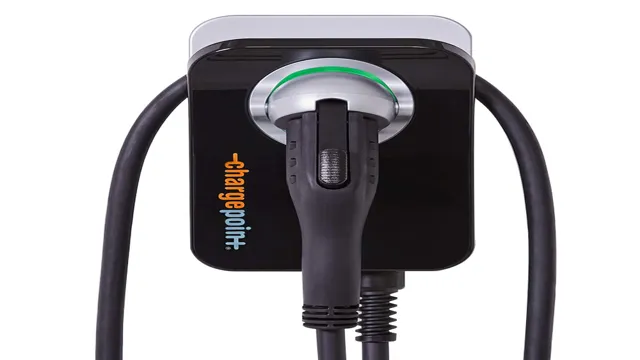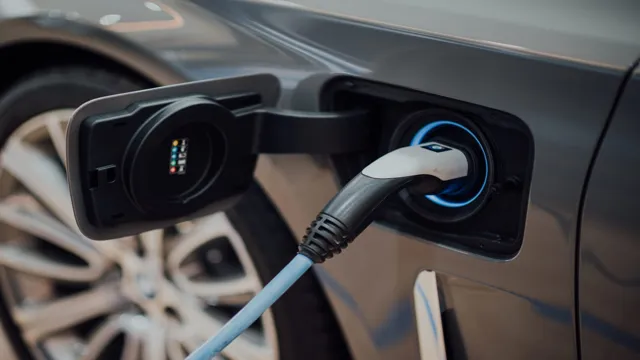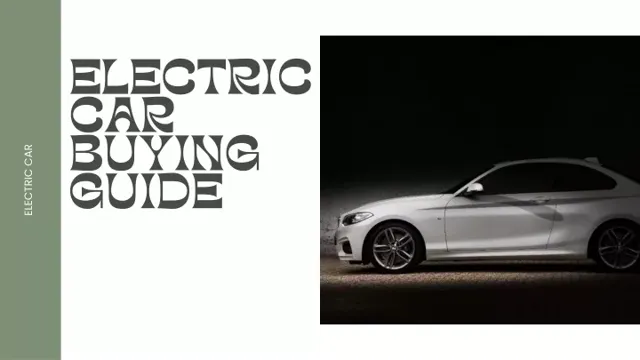Plug into the Future: Your Ultimate Electric Car Charger Guide
As electric cars become more popular, the need for electric car chargers has increased. Many electric car owners are left with questions on how to choose the best charger for their car. With so many options on the market, it can be overwhelming to decide which one to purchase.
Luckily, this guide will provide you with all the information you need to know about electric car chargers. From the different types of chargers to installation requirements, this guide will ensure you make an informed decision. So, buckle up and let’s dive into the world of electric car chargers!
Introduction
Are you considering buying an electric car but don’t know much about the different types of electric car chargers available? Don’t worry, this electric car charger guide has got you covered. There are three main types of electric car chargers: level 1, level 2, and fast DC chargers. Level 1 chargers are best suited for at-home charging, while level 2 chargers are more powerful and can fully charge your car in a few hours.
Fast DC chargers are the most powerful, capable of giving you an 80% charge in as little as 20 minutes. It’s also important to consider the amperage and voltage requirements of your car, as well as the charging infrastructure in your area. With this guide, you’ll be well-equipped to choose the right electric car charger for your needs.
Why Electric Car Chargers Matter
Electric Car Chargers Electric cars are becoming increasingly popular due to their affordability, energy efficiency, and eco-friendliness. However, it’s not just enough to have the car, but also the infrastructure to support it. Installing electric car chargers is crucial for the widespread adoption of electric cars, as it alleviates concerns about range anxiety.
With the ability to charge your car quickly and conveniently, electric car chargers make owning an electric car a viable option for more people. Not only that, but they also play a big role in reducing greenhouse gas emissions and promoting a greener future. In this blog section, we will explore why electric car chargers matter and how they are beneficial for both individuals and the environment.

Types of Electric Car Chargers
As electric cars continue to rise in popularity, one of the major concerns for potential buyers is how long it takes to charge them and where they can find charging stations. Fortunately, the options for electric car chargers are expanding and becoming more convenient. There are three main types of electric car chargers: Level 1, Level 2, and DC Fast Charging.
Level 1 chargers use a standard 120V household outlet and can take up to 24 hours to fully charge an electric car. Level 2 chargers are faster and use a 240V outlet, typically found in garages or parking lots. These chargers can fully charge an electric car in 4-8 hours.
Finally, DC Fast Charging, also known as Level 3 charging, is the fastest and most convenient option. These chargers can charge an electric car up to 80% in as little as 30 minutes. It’s important to note that not all electric cars are compatible with all types of chargers, so it’s important to do research and make sure you have access to compatible chargers before purchasing an electric car.
Home Charging
Electric cars are becoming increasingly popular, and with that comes the need for home charging solutions. A reliable and efficient electric car charger is essential for keeping your car’s battery topped up and allowing you to enjoy the full benefits of electric driving. When choosing an electric car charger, there are a few things to consider.
Firstly, you need to determine the type of charging you require. Level 1 charging uses a standard household outlet and is the slowest option, while Level 2 charging requires a dedicated 240-volt outlet and charges your car faster. You should also consider the charging speed and the size of the charger, as well as the brand, warranty, and price.
It is important to choose a reputable brand with a good warranty to ensure your charger is reliable and long-lasting. Lastly, consider the convenience of the charging station placement, as it could potentially impact the overall cost and installation time of the electric car charger. Overall, choosing the right electric car charger is essential for an optimal driving experience.
Benefits of Home Charging
Home charging is an incredibly convenient and cost-effective way to charge your electric vehicle. With the ability to plug your car into a charging station within the comfort of your own home, you no longer have to worry about taking detours to find a charging station while you are out and about. Home charging also allows you to schedule your charging time during off-peak electricity hours, saving you money on your electricity bill.
Additionally, home charging ensures that your car is fully charged every day, eliminating any worries about running out of battery power on the road. It’s like having your own fuel station in your garage! Furthermore, investing in a home charging station increases the value of your property and makes your home stand out if you decide to sell it in the future. In short, home charging provides convenience, cost savings, and peace of mind to electric vehicle owners.
Choosing a Home Charging Station
When it comes to electric cars, home charging is essential. But with so many options available, choosing a home charging station can be overwhelming. The first thing to consider is the charging speed you require based on your daily driving needs.
Level 1 chargers require 120-volt outlets and take a few hours to charge your car, while level 2 chargers require a 240-volt outlet and can charge your car in as little as two hours. Next, choose a charging station that is compatible with your car and has proper safety certifications. You should also consider the location of the charging station and whether it requires a professional installation.
It’s also important to go for a charging station that offers user-friendly features such as charge scheduling, remote monitoring, and smart charging. With these factors in mind, you can choose the right home charging station that meets your needs.
Installation and Set-Up
Home charging for your electric vehicle is a crucial aspect that requires consideration when switching to an EV. However, the installation and set-up process of a home charging station may seem intimidating at first. The good news is that it’s not at all complicated, and you don’t need to be a technology expert to get it done.
Essentially, home charging requires a dedicated charging station attached to your home’s electrical system. The first step is to check your home’s electrical capacity to determine if it can handle the additional load. You will also need to decide on a location (garage, driveway, etc.
) and ensure that it’s within reach of your car’s charging port. Once you have all of these important details sorted out, you can move on to selecting a home charging station that fits your needs and budget. From there, you simply need to have it installed by a licensed electrician, and you’re all set! With a home charging station, you have the convenience of charging your EV overnight or whenever it’s parked at home, saving you time and money in the long run.
Public Charging
Electric cars are becoming increasingly popular as people seek more sustainable ways to travel. However, a common concern among electric car owners is access to public charging stations. Luckily, there are now many options available.
Most electric cars come equipped with chargers that can be plugged into conventional outlets, although this is much slower. Superchargers can be found at certain locations and can charge a car in just a few hours. Some businesses have started installing charging stations in their parking lots and garages, and public charging stations can be found at many rest areas, parking garages, and other public locations.
Checking online to find the location and availability of charging stations can help ease worries about access. Although charging times and availability can vary, having a plan in place for public charging can help electric car owners minimize range anxiety and get the most out of their vehicle.
Benefits of Public Charging
Public charging for electric cars has numerous benefits for EV drivers. Firstly, it provides a convenient way to charge up when away from home or work. This is especially useful for drivers who may not have access to private charging facilities.
Secondly, public charging can greatly extend the range of an EV, allowing drivers to travel further without the need to worry about running out of charge. Additionally, public charging stations often offer faster charging speeds than at-home charging, enabling drivers to top up their batteries quickly and get back on the road. Lastly, using public charging facilities is a great way to promote sustainable energy consumption and reduce carbon emissions.
By opting to charge their vehicles using renewable energy, EV drivers can play an important role in reducing their carbon footprint and helping to combat climate change. As EV adoption continues to grow, expanding the availability of public charging infrastructure will be critical in ensuring that drivers can rely on their EVs for all their transportation needs.
Finding Public Charging Stations
Public charging stations are becoming more common as electric vehicles gain popularity, and finding them is easier than you might think. There are several ways to locate public charging stations in your area, including using apps like ChargePoint, PlugShare, and EVgo. These apps provide maps of nearby stations and allow you to filter by charging speed, network operator, and even amenities like restaurants and shopping.
Another option is to check with local government entities, as many cities and municipalities have databases of public charging stations available online, and some electric utilities also offer map services that highlight available charging stations. By taking advantage of these resources, you’ll be able to find the charging stations you need to keep your electric vehicle powered up and ready to go!
Charging Etiquette
If you’re new to electric car ownership, you may be wondering about charging etiquette. While electric vehicle (EV) charging stations are becoming increasingly common, there are still some unwritten rules to follow. First, it’s important to only use a charging spot when you actually need to charge.
Don’t park in a charging spot if your battery is already full. Additionally, it’s courteous to move your car as soon as it’s charged to allow others to use the spot. If there’s a waitlist for charging, it’s best to limit your charging time to 30 minutes to allow others to take their turn.
Remember, EV charging is a shared resource, so it’s important to be considerate of others in the EV community. By following these simple guidelines, you’ll ensure that everyone can access electric car charging stations when they need them.
Tips for Charging Responsibly
When it comes to charging your devices in public, it’s essential to be considerate of others and practice proper charging etiquette. Avoid monopolizing the power outlet and allow others to charge their devices as well. Don’t leave your device unattended or take up unnecessary space by using multiple outlets for one device.
Instead, unplug your device once it’s fully charged to make room for others. Additionally, be mindful of the charging time and don’t hog the outlet for extended periods. Charging etiquette is all about being considerate and respectful of others’ needs, so make sure to follow these tips for responsible charging.
By doing so, you’ll ensure that everyone has a fair chance to charge their devices and that no one is left without battery life when they need it the most.
Common Charging Mistakes to Avoid
Charging your phone is a daily task that most of us overlook. Unfortunately, the way we charge our phones can affect the battery’s lifespan. The first rule of charging your phone is to avoid overcharging.
Leaving your phone plugged in after it reaches 100% battery can damage the battery cells and shorten its lifespan. Another common mistake is using third-party chargers, which can cause overheating and battery damage. It’s important to use the charger that comes with your phone or buy one from a trusted manufacturer.
Charging your phone while it’s in a case can also cause overheating, which can damage the battery. Finally, avoid charging your phone with a low-quality cable, as it can affect the charging speed and may cause damage to the connector over time. Overall, following these charging etiquette tips will ensure that your phone’s battery is healthy and lasts longer.
Conclusion
After writing this electric car charger guide, I’ve come to realize that charging an EV may seem daunting at first, but like any other technological innovation, it becomes second nature once you get the hang of it. Whether you’re a seasoned EV owner or a newbie, always keep in mind that the world is moving towards a more sustainable future, and electric cars are leading the way. So, grab your charger, zap some watts into your battery, and join the EV revolution! Remember, as Benjamin Franklin once said, “Electricity is the fruit of a trained will, and the jack-of-all-trades in the arsenal of labor.
“
FAQs
What is an electric car charger?
An electric car charger is a device used to recharge the battery of an electric car.
How does an electric car charger work?
Electric car chargers work by converting AC electricity from the power grid to DC electricity which is stored in the car’s battery.
What are the different types of electric car chargers?
There are three types of electric car chargers: Level 1, Level 2, and DC Fast Chargers.
What is Level 1 electric car charger?
Level 1 electric car charger is a basic charger that connects to a standard 120-volt household outlet and charges the car at a rate of 2 to 5 miles of range per hour.
What is a Level 2 electric car charger?
A Level 2 electric car charger is a faster charging device that requires professional installation and uses a 240-volt circuit. It can provide up to 25 miles of range per hour.
What is a DC fast charger?
A DC fast charger is the fastest electric car charger that uses a direct current to charge the battery and can provide up to 80% charge in 20-30 minutes.



